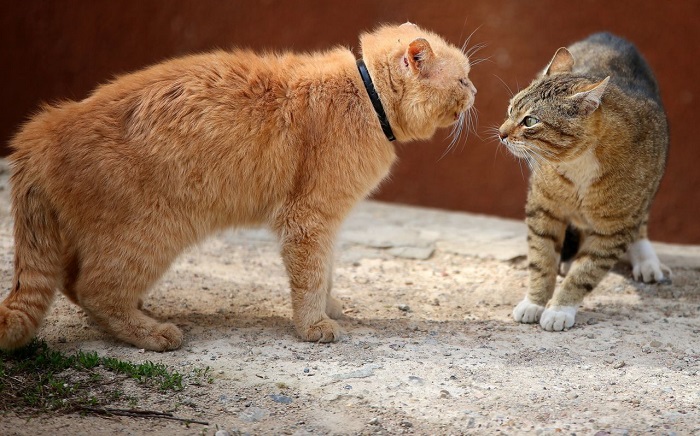If you are a cat owner, you may have noticed that your male cat is not interested in mating with female cats. This can be quite concerning, especially if you were planning on breeding your cat or if you want to ensure that your cat has a healthy reproductive system. In this article, we will explore the reasons why male cats refuse to mate and what you can do about it.

1. When Do Male Cats Reach Sexual Maturity?
Just like humans, cats go through different stages of development from when they are young until they reach adulthood and eventually old age. When it comes to sexual maturity, male cats experience an increase in hormones that trigger their natural instinct to mate with female cats. This is a completely normal process for cats. Typically, male cats reach sexual maturity between 6-9 months of age. However, at this point, they are not considered fully grown yet. It is only after they reach 12 months of age that they are considered adults and are ready to mate. But even at 6-9 months, male cats are capable of mating with female cats and impregnating them. Therefore, it is important to keep an eye on your male cat’s behavior once they reach sexual maturity.
1.1. Signs of Sexual Maturity in Male Cats
You may be wondering how you can tell if your male cat has reached sexual maturity. Here are some signs to look out for:
- Increased vocalization: Male cats tend to become more vocal when they reach sexual maturity. They may meow more often or make other sounds to attract female cats.
- Spraying: Another sign of sexual maturity is when male cats start spraying urine to mark their territory. This is a way for them to communicate their availability to female cats.
- Aggressive behavior: Some male cats may become more aggressive towards other male cats during this time. This is because they are competing for female attention.
- Restlessness: You may notice that your male cat becomes more restless and anxious. This is because they are in search of a mate.
If you notice any of these signs, it is likely that your male cat has reached sexual maturity and is ready to mate.
1.2. The Best Age for Male Cats to Mate
While male cats can technically mate once they reach sexual maturity, it is recommended to wait until they are at least 12 months old before allowing them to mate. This is because at this age, they are fully grown and have developed both physically and mentally. Mating too early can put a strain on their still developing bodies and can lead to health issues later on. It is also important to note that male cats can continue to mate well into their senior years, so there is no rush to breed them as soon as they reach sexual maturity.
2. Why Do Male Cats Refuse to Mate? What Can You Do?

Now that we have established when male cats reach sexual maturity, let’s dive into the reasons why they may refuse to mate and what you can do about it.
2.1. Lack of Experience
One of the most common reasons why male cats refuse to mate is simply because they lack experience. Just like humans, cats need to learn how to properly mate and this takes practice. If your male cat has never mated before, he may not know what to do or may be too nervous to attempt it. In this case, it is best to give him some time and space to learn and gain confidence. You can also try introducing him to a more experienced female cat who can guide him through the process.
2.2. Not Fully Matured
As mentioned earlier, male cats are not considered fully mature until they reach 12 months of age. This means that even though they may have reached sexual maturity, their bodies and minds are still developing. As a result, they may not be physically or mentally ready to mate. In this case, it is best to wait until they are fully matured before attempting to mate them.
2.3. Lack of Interest in the Female Cat
Just like humans, cats can also have preferences when it comes to their potential mates. Your male cat may simply not be interested in the female cat you have chosen for him. This could be due to a variety of reasons such as personality differences, scent, or even physical appearance. In this case, it is best to try introducing your male cat to different female cats to see if he shows more interest in any of them.
2.4. Other Underlying Factors

There are also other factors that could contribute to why your male cat refuses to mate. These include:
- Health issues: If your male cat is experiencing any health problems, he may not have the energy or desire to mate.
- Stress: Cats are sensitive creatures and can easily become stressed by changes in their environment or routine. This stress can affect their behavior and may cause them to refuse to mate.
- Previous negative experiences: If your male cat has had a negative experience while attempting to mate, he may associate it with something unpleasant and therefore refuse to do it again.
If you suspect that any of these factors may be causing your male cat to refuse to mate, it is important to address them and find a solution before attempting to mate your cat again.
Conclusion
In conclusion, there are various reasons why male cats may refuse to mate. It is important to remember that each cat is unique and may have their own preferences and needs. If your male cat is refusing to mate, it is best to give them time and space to learn and gain confidence, and to try introducing them to different female cats. If the issue persists, it is best to consult with a veterinarian to rule out any underlying health issues or to address any other factors that may be causing your cat’s behavior. With patience and understanding, you can help your male cat reach his full potential as a breeder.
